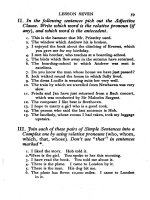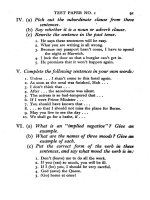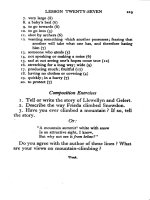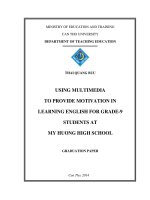Essential english for foreign students book 2
Bạn đang xem bản rút gọn của tài liệu. Xem và tải ngay bản đầy đủ của tài liệu tại đây (11.53 MB, 253 trang )
FOR FOREIGN STUDENTS
Book 2
BY C. E. ECKERSLEY
ESSENTIAL
ENGLISH
for
Foreign Students
BOOK TWO
- vevised edition
C. E. ECKERSLEY
Illustrations by
CHARLES SALISBURY,
_ BURGESS SHARROCKS
and from ‘Punch’ and ‘The Humorist’
FOREIGN ie: PRESS
LANGUAGES
Sofia, 1967
PREFACE -
ESSENTIAL ENGLISH is a course in four books, of which this
1s the second, for the teaching of English to adult foreign
students. Ít aims at giving the student a sound knowledge
of the essentials of both spoken and written English and
taking him well on the way to a mastery of idiomatic
conversational and literary English.
The normal constructions and sentence patterns of English
are introduced gradually and systematically, and are well
drilled at every stage. The learner is guided through
“ essential ” grammar in the simplest possible manner, and
every new construction is explained and illustrated as soon
as it is used.
The restricted vocabulary within which the four books are
written has been based on A General Service List of English
Words. But neither this list, nor any other list, has been
followed slavishly and blindly ; the vocabulary and the
grammar and the structures talight have been tested constantly
by the experience gained during some thirty years of teaching
English to foreign students or writing text-books for them.
Because I believe that a knowledge of the spoken tongue
is the true basis of language learning, much of this book is in
“ conversational” form; and my constant endeavour has been
to ensure that, despite the restrictions that a limited vocabu-
lary naturally imposes, every sentence in these conversations
is expressed in the living colloquial idiom that an educated
Englishman would use.
_ And, since the most effective spur to learning a language
(or anything else) is interest, every effort has been made to
cover the linguistic pill with the jam of gaiety. So, as soon as
the preliminaries are mastered, the reader is introduced to
Mr. Priestley, his household and his group of students. We
see them here and in all the other books. chatting together,
1 A new edition of the Interim Report on Vocabulary Selection
(Longmans).
V
` ví PREFACE
telling jokes, reading stories that they have written, singing
songs or acting short plays. It is on these conversations and
stories and the “ talks by Mr. Priestley ” that the language
teaching is based, and from them that the copious exercises
by which the teacher is enabled to test how far the work has
been understood, are drawn.
There are numerous changes in this new edition. Fresh,
and it is hoped, more interesting reading material has been
added including a short play, some episodes in the Priestley
household, a song and two poems, and two new stories about
Hob’s extraordinary relatives.
Special attention has been paid to the use of the Tenses in
English, and three ‘‘ Examination Papers ”, for revision, have
been introduced (after Lessons 10, 21, 33). There. are five
new “ Stories Without Words ” (pages 26, 55, 75, 149, 237),
and an attempt has been made to teach some points of
grammar in a lively, pictorial manner, as, for example, on
pages 87, 129, 160, 170, etc. An index also has been added.
In the Teacher’s handbook! that has been prepared to
accompany this volume, further guidance has been given on
the main techniques of language teaching, a great deal of
extra teaching material has been given in the “ Commen-
taries ”’, detailed suggestions and practical hints are given on
- the teaching of each lesson, and a complete Key to the
exercises and solutions to puzzles and crosswords in the
Pupil’s Book is provided.
Though a text-book that is the ideal one to every teacher
and student is, perhaps, an impossibility, it is hoped that
most students and teachers will feel that this new edition is
an improvement on the old one, but the author will be most
grateful at any time for further criticisms and suggestions
that will help to make EssentiaL ENGLISH more useful to
those who study it or teach from it. . «CEE.
August 1955.
1 Essential English, Book II, Teacher's Book.
?
CONTENTS
LESSON
1 THE PRiesrLrvs" House . oe .
2 COMMENTS ON LESSON 1. POSSESSIVE PRONOUNS,
Past Perrect TENSE, Ip1oMATIC EXPRESSIONS .
3. Tue VocaBuLary OF EVERYDAY Lire . ‹
4 EVERYDAY TALK. . . . . .
5 Parts or SPEECH . oo. . .
6 HOB TELLS A True Story .
7 COMMENTS ON Lesson 6. Past Continuous TENSE,
REFLEXIVE PRONOUNS AND EMPHASISING PRONOUNS
8 One Giorious Hour . . . . :
g Kinps or Nouns . .
10 IMMARGARET PRIESTLEY”S BtTHDAY MORNTNG `
EXAMINATION PAPER NoO..I. . . . :
II TWO POEMSANDASONG . : . . .
12 THe Furure TENSE. ` .
14 PFRIEDA WRITESA LETTER HOME ..
14 COMMENTS ON LESSON 13. LETTERS . . .
1§ HOLIDAYS HAVE STARTED . . . . . 102
16 THe Furure Continuous TENSE ..
17 ThHE RAILWAY STATION: . . . . 107
. II1
18 Money. . . 2 . . . 116
19 PLURALSOF NOUNS . - . 2 127
20 JAN AND FRIEDA LEAVE FOR SWITZERLAND . . 133
21 GENDER OF NOUNS..... . . : . ‹
EXAMINATION PAPERNO.2. . . .. 146
: 22 Hos’s Story or His ỦNCLE TOM.. : . . 151
23 ACTIVE AND PASSIVE VOICE . L. ti. . . 157
24 BACK FROM THE ÏOLIDAYS .. . . ¬ 163
25 “THE FUTURE PERFECT TENSE . . . . 172
26 EvEerRDAY SITUATIONS . . . . . . 177
27 WEIGHTS AND MEASURES . _. . . . 189
28 THe ARTICLES . . . . vo. . 193
vi CONTENTS
LESSON PAGE
- 29 MEALS . . . °. . . 199
30 Some More SHOPPING 206.
31 Dress . 214
32 Friepa’s First Day IN “Lonpon Essential 220
33 Ovar Reaps His Pray. 226
EXAMINATION Paper No. 3
PRONOUNCING VOCABULARY OF English 234
Boor II.
INDEX 238
247
LESSON 1; 8
The Priestleys’ Housew t
You have heard (in Book I) about Mr. Priestley
and his students. I want, now, to tell you something>
about his house. He is an old friend of mine, and I
went to visit him about a fortnight ago and stayed at1 %
his house for the week-end.
He lives in a very nice house. It-is called ‘The
Pines” and is about ten miles from London. There
is a big garden all round it,and I went in at the garden
gate and walked along the path to the front door.
. There is a smooth lawn in front of the house with
beds of roses in it. I knocked at the front door.
zsi
rai
THỈNH
mG T,
I
2. ESSENTIAL ENGLISH
Mr. Priestley opened it and, with a smile and some
words of welcome, shook hands with me, and we went
into the hall. Then Mrs. Priestley came to greet me.
I said, ‘‘ How do you do ?”’ and gave her the flowers
that I had bought for her.
She said, “Oh, thank you. What beautiful roses!
How kind of vou to bring them! I love roses, and ours
haven’t been good this year. These are lovely.”
She took them away to put them in water, and
Mr. Priestley and I went into the sitting-room and
sat down in armchairs before the fire, for it was a.
rather cold day and I was very pleased to see the
bright fire burning in the fireplace. |
Their sitting-room is quite a big room, about 25
feet long by 15 feet wide. There was a thick carpet on
the floor. One or two good water-colours hung on
the walls, and there was a large and very interesting
oil-painting that I hadn’t seen before. There was a
piano on one side of the room (both Mr. and Mrs. - - „
v
LESSONONE _ 3
Priestley are fond of music, and Mrs. Priestley plays
the piano beautifully). There were three or four
comfortable armchairs, a radio, and three or four
bookcases filled with books. On a small table near
the window there were copies of The Times, Punch
and some foreign newspapers and magazines. Mrs.
Priestley returned with the roses in a bowl which she
put on the table and a few minutes later Susan! came
in with tea and a very nice cake.
I had expected to see John Priestley and Margaret.
I had brought a box of chocolates for her; I knew she
liked chocolates, but they told me John was up at
Oxford and Margaret had gone to a birthday party
at the house of a friend of hers.
After we had chatted for 4 little time, Mrs. Priestley
said, ‘‘ Will you excuse me, please? I want to see about
the dinner. Did you know that Lizzie! had left us?”
“No, I didn’t,” I said.
“Yes,” continued Mrs. Priestley, “she got a letter
about a month ago to say that her sister-in-law had
died, and so Lizzie has gone to keep house for her
brother. That cake that we had at tea was hers; she
sent it to me yesterday. Since she left, I have done the
cooking and baked the cakes, but mine are never as
good as hers.”
“‘Nonsense, my dear; I don’ t think Lizzie’ s cakes
were any better than yours,’ "said. Mr. Priestley,
loyally.
_ “Take no notice of Charles,” said Mrs. Priestley
with a smile. “ They say love is blind; it seems to me
he. can’t taste, either. My » husband’ s ideas about
1 You remember Susan, the maid and Lizzie, the cook, in Book I.
4 ESSENTIAL ENGLISH
grammar are, I am sure, better than mine, but when.
it’s a question of ideas about cakes, mine are far
better than his.”
_. She went out, and Mr. Priestley said, “It’s bad
luck about Lizzie, isn’t it? I’m afraid Susan will go,
too, before long. A young fellow near here, Joe
Marsden, has asked her to marry him. He. is trying ©
to buy a café in the High Street. The café is not his
yet, but [ think he’ll get it, and, when it zs his, I’m
pretty sure Susan will marry him and go to help him
to run the café. It will make things difficult for, my
wife. Ours is quite a big house for one woman to run,
and it’s almost impossible, nowadays, to get help 1in
the house.” -
After a little time Mrs. Priestley joined us again
and said, ‘‘ Dinner is ready,” so we went to the dining-
room, a pleasant-looking room with a Persian carpet
on the floor, a dark oak dining-table, six chairs and a
sideboard. A red lampshade gave a warm colour to
the room, and an electric fire kept it comfortable while |
we had dinner. Susan drew the brown velvet curtains
across the windows as it was now quite dark outside,
and we sat down to dinner, a very English one—
roast beef and Yorkshire pudding, roast potatoes, and
cabbage grown in their own garden, followed by
apple-pie with thick cream and sugar.
When we had finished dinner, Susan took the
dishes from the dining-room to the kitchen, and
Mrs, Priestley went with her to make coffee. Mr..
_ Priestley took me to his study for a quiet smoke and
to show me some of his books.
After a quarter of an hour or so, Mrs. Priestley came
LESSON ONE 5
to tell us she had made the coffee and it was in the
sitting-room. So we went there to take coffee and talk
together and listen to the news on the radio. Then
Mrs. Priestley played some Chopin, my favourite
- composer for the piano. It was now eleven o’clock and
I was feeling rather tired. Mr. Priestley saw this and
said, “‘ You have had a tiring day and you look sleepy;
come along upstairs to your bedroom.”
IIECAA SINO TNE oN ay
QS Serr mm...
À2 TERRACE Can =
° = A GARAGE
TT.DINING KITCHEN
ROOM
SITTING
PLAN OF THE HOUSE
Upstairs there are five bedrooms, a bathroom and a
lavatory. We went to my room and he said, ‘‘ Here
you are. There is running water in your room and
you can wash there or go to the bathroom, whichever
you prefer. You will find soap in the soap-dish, and
here are your towels. Put on the electric fire and warm
your pyjamas before putting them on. There are
6 ESSENTIAL ENGLISH
sheets and three blankets on your bed, and my wife
has put a hot-water bottle in it, but if you are not
warm enough there is an eiderdown here. Now, do
you want anything else ?”’
I said, “Oh, no, thank you. I shall be very comfort-
able.’ He added, ‘‘ We have breakfast rather early—
about a quarter past eight—but you can, of course,
come down later if you like and have breakfast then.”
I said, “I will come down and have breakfast with
you.’
“All right,” he said; “Tl bring you a cup of tea
at half past seven; that will give you time to get
properly awake, shave and have a bath before break-
fast if vou feel like it. It will be all right if you take
a bath about a quarter to eight. I have mine at seven,
and my wife and Margaret take theirs in the evening.”
“Splendid,” I said; ‘thank you very much. Good
night.”
PRONUNCIATION DRILL
[i:] (i] a, [=]
greet continue blanket reply blanket
keep excuse café! - favourite chat
magazine prefer velvet - visÍt lamp
sheet pyjamas carpet splendid magazine
[a] bị floor J}. fu) - [u]
lawn
bath bottle board room smooth
carpet copy _— yours book continue?
_— path knock shook excuse?
pyjamas nonsense pudding
? also, and more usually, [et] [‘kefei]. .
2 The sound here is [ju:].
fo} fou} LESSON ONE 7
— 8
curtain soap — afraid continue magazine
furniture bowl along favourite nonsense
awake furniture nowadays
oak composer loyal pyjamas?
grow
[ai] . :E®]
——
blind mine . chair
die reply _theirs
eiderdown pie upstairs
side smile
EXERCISES
I. Use in sentences of your own the following words:
1. comfortable 5. velvet ọ. welcome
2. lampshade 6ó. lawn: - 10, sideboard
3. path 7. bowl,
4. carpet 8. pyjamas II. café
12. eiderdown
II. Answer the following questions fully: / /
1. Where is Mr. Priestley’s house and what is it called ? /
z. What is there in front of the house ?
3. What did Mrs. Priestley say about the roses?
4. Where were (a) John, (6) Margaret Priestley ?
5. Describe (a) the sitting-room, (4) the dining-room.
6. What did they have for dinner ?
7. Why had Lizzie left the Priestleys ?
8. Why does Mr. Priestley think Susan will leave them ?
g. What did Mr. Priestley say about his wife’s cakes?
10 . What was her reply?
1 Two pronunciations: [pa’d3a:maz], [pi’dza:moz]. -
it
8 ESSENTIAL ENGLISH
Dictation
John Priestley is at Oxford University. He has two rooms, a
sitting-room and a bedroom. His sitting-room is a pleasant one.
There is a thick carpet on the floor, arid one or two water-colours
and black and white : drawings hang on the walls, Near the door is a
bookcase filled with books, and by the window is a table at which
John works. On it are some books and copies of University
magazines. John is not working now; he is making coffee. A
friend is coming to his rooms for a chat. On a plate are some
cakes which Mrs. Priestley has baked.
John goes to the window and looks at the smooth lawns and
roses and the old, grey walls. It is getting dark, so he draws
the curtains and puts on the light. It has a red lampshade which
gives a warm colour to the room. A fire is burning brightly in
the fireplace.
John hears a knock at the door. His friend has come.
Composition Exercises
. Describe the pictures on pages 1 and 2.
2. Describe the furniture etc., in (a) your sitting-
room, (6) your dining-room, (¢c) your bedroom,
(d) your kitchen.
3. Describe the house you would like to live in.
LESSON 2
CoMMENTS ON LESSON 1
Possessive Pronouns
You have had the Possessive Adjectives (my, your
his, her, its, our, their) in Book I. In the last lesson you
had these examples of the Possessive Pronouns: #une,
yours, his, hers, ours, theirs:|
I love roses, and ours haven’t been good this year.
[ don’t think Lizzie’s cakes are any better than yours.
The cake we had at tea was one of hers; mine are never as
good as hers.
His ideas about grammar are better than mime, but when it’s
a question of ideas about cakes, mine are better than /is.
4
The café is not his yet; when it is Ais, Susan will marry him.
— Ours is quite‘a big house.
You can take a bath at a quarter to eight; [ have mune at
seven, and my wife aad Margaret have thems in the evening.
. a , 9 , :
2—~H
10 ESSENTIAL ENGLISH
_As you can see, the Possessive Adjective qualifies
a noun; the Possessive Pronoun stands instead of,a
noun, e.g.
Possessive Adjective
| Possessive Pronoun
Lizzie’s cakes are not better ˆ Lizzie’ s cakes are not better
_ than your cakes (Adjective than yours. `
++ Noun).
Ihave my bath at seven; my 1 have mine at seven; my
wife and Margaret have wife and “Margaret have
their baths in the evening. theirs in the evening. `
When it’s a question of ideas When it’s a question of ideas
about cakes my ideas are about cakes, mine are better ©
better than zs ideas. ° ol than hủ,
Here are the Personal Pronouns, the Possessive
Adjectives and the Possessive Pronouns: : |
Personal _` Possesstoe Possessive
._ Pronoun. Adjective... |... Pronoun - .)
I. ‘my mine --
you” : VOUT yours - a rộn
- ghé ˆ her :herg . “|
we our ours
' they the - _ theirs
‘There i is a Possessive “Adjective its, ẻ 8: n hever
The dog has eaten its dinner.
The bird-is. im its:nest.:
“The: Possessive Pronoun its ‘isS practically
used.
LESSON. TWO Ir
“: Note the difference between its (Possessive Adjec-
tive) and it’s (short form of it is), e:g. :
It’s a long way to Tipperary.
N ote the idiomatic use of the Possessive Pronoun i in
the sentences: ©
He is an old friend of mine. (NOT, “an old friend of me’’).
_ _ Margaret has gone toa party at the house of a friend of
hers. (NOT, ‘‘a friend of her’).
Past Perfect Tense
In Book I we studied the Present Perfect Tense, .
e.g. . .
I have had my car for a year.
Hob hasn’t done his homework,-
In Lesson 1 of this book you have some examples of
‘the Past Perfect Tense:
I gave her the flowers that I had bought for her.
There was an oil-painting that I Aadn’t seen before.
I had brought a box of chocolates for Margaret;
"They told me. Margaret had gone to a birthday party.
After we had chatted for a little time, Mrs. Priestley went to
see about the dinner.
Mr. Priestley said that Lizzie Aad left them.
She got a letter to say that her sister-in-law had. died.
When we had finished dinner, Susan took the dishes to the
kitchen. _,
Mrs. Priestley came to tell us she had ‘made the coffee.
We. form the Past Perfect Tense by using Aad with
the past participle.
ø
12 -_- ESSENTIAL ENGLISH
- The Past Perfect Tense is used to show that one
action was completed before another action in
the past.
°
Let us, for example, take the sentences:
(1) Pedro learned English. (z) He came to England.
Both these actions took place in the past, so we use
the Simple Past Tense learned-and came.
But suppose we want to show that one of these
actions took place before the other one. Suppose we
want to say that Pedro learned English before he came
to England. Then we use the Past Perfect Tense for
the action that took place first, and we use the Simple
Past Tense for the other action. We say:
Pedro had learned English before he came to England.
Mrs. Priestley made coffee. Then she came to tell us.
So you had the sentence:
Mrs. Priestley came (Simple Past) to tell us she had
made (Past Perfect) the coffee.
So with the other sentences:
Lizzie’s sister-in-law died, Lizzie got a letter.
Lizzie got a letter to say that her sister-in-law had died,
We chatted fora little time. Mrs. Priestley went to see about
the dinner. /
After we had chatted for a little time, Mrs. Priestley went to
see about the dinner.
I bought some flowers (in ‘the morning). I ‘gave them to
Mrs. Priestley (in the afternoon). I gave her the flowers I
had bought for her.
LESSON TWO có 13
T16
Here are some more examples of the Past Perfect
_ Tense: |
When Margaret had finished her homework, she turned on the
radio. .
I had already got home before it-began to rain. -
Jan bought a new exercise book, because he had filled his old
one,
The children came to the party at 4 o’clock; but before that,
Ann and Ellen Thompson had decorated the room, Mrs.
Thompson had baked cakes, and Mr. Thompson had bought
a small present for every little guest. '
(You remember that Margaret had gone to a birth-
day party. It was at the house of her friend, Ann
Thompson ; you saw Mr.’Thompson and his family in
' Book I on p. 166).
HOB: Here’s a story with some examples of the Past
Perfect Tense: it’s about a novelist who had
written some novels that had been very successful.
One day he met an old friend that he hadn’t seen
for years. After they had talked for two hours,
the novelist said, ‘Now, we’ve~talked about me
long enough; let’s taik about you! What did you
think of my last novel ?”’
14 ESSENTIAL ENGLISH
_In-laws.
You had the sentence: "
Lizzie’s sister-in-law had died.
Thiss drawing shows the Priestley family _ .
William Priestley * (“ Grandfather’ )
| `7 Norah |(married . |
Mr. Priestley to George Macaulay) David.
(married to Mary)
John - Margaret Colin. tdlan mã
Mrs. (Mary) Priestley is daughter-in-law to William
Priestley. She is sister-in-law to Norah Priestley
(Norah Macaulay). William Priestley is. her father-
in-law.
George Macaulay is Mr. Priestley’s brother-in-law.
He is William Priestley’s son-in-law. _
The mother-in-law of Mrs. Priestley and George
Macaulay was ‘‘ Grandmother” Priestley. She is dead.
John and Margaret are cousins to Colin,. Lilian,
and Andrew. | .
"Idiomatic Expressions
There are a number of idiomatic expressions to
note in Lesson 1,.¢.g.: |
“for the week-end” (usually Friday night to “Monday
morning).
“John is up at Oxford.” Students: “go up’ when work
. begins and '“go down”? for holidays. .
1 He is a widower. His wife died two years ago.









